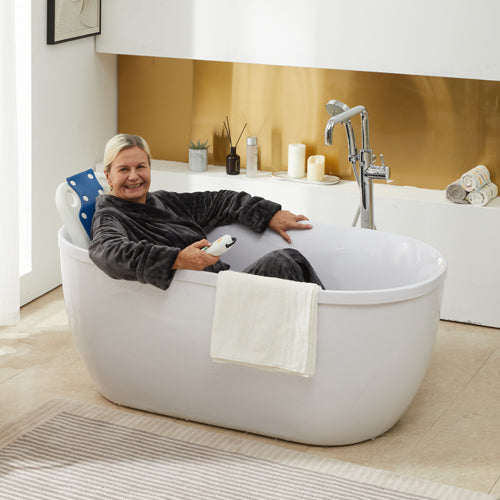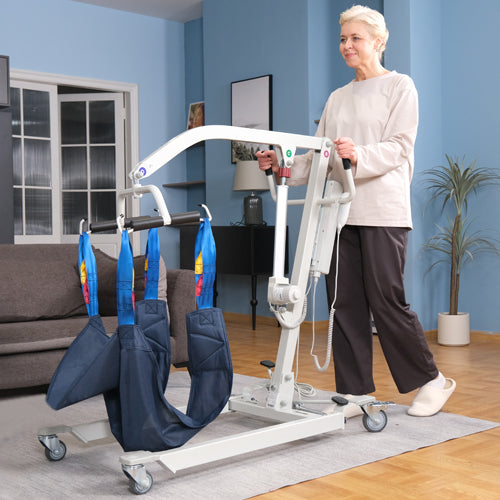Choosing between a wheelchair and a walker can be a difficult decision, especially when it comes to finding a mobility aid that fits your mobility needs. In this article, we will analyze the key differences between these two aids to help you decide which one is best for you and improve your daily life.
What Is a Wheelchair?
A wheelchair is a device that helps people who have difficulty walking or are unable to walk move around more easily. It is like a chair with wheels that provides comfort and mobility, whether you are moving alone or with help. There are different types of wheelchairs, all of which allow you to move freely, stay active, and keep up with your daily activities.
What Types of Wheelchairs Are There?
The following are the more common types of wheelchairs:
-
Manual Wheelchairs: These require manual pushing by the user or a caregiver. Manual wheelchairs are lightweight and portable and are suitable for users with sufficient upper body strength.
-
Powered Wheelchairs: Powered wheelchairs have batteries and motors that allow the user to move independently without the need to expend physical effort. Powered wheelchairs are a good choice for people with limited upper body strength or endurance.
-
Transport Wheelchairs: Transport wheelchairs are lighter and more compact than standard wheelchairs, and are designed for travel and short trips. However, transport wheelchairs must be pushed by a caregiver, as they do not have large wheels for self-propulsion.
What Is a Rollator Walker?
A walker, or simply a mobility aid, is a wheeled device that makes it easier to get around without having to lift it with every step. It's suitable for people who need extra support while walking but still want to stay active. Walkers also come with a convenient seat for you to rest when you need to and usually come with a basket or bag to carry your belongings. If you're someone who likes to keep moving but needs a little help with balance or stamina, a walker is a device that can help you walk confidently and comfortably.
What Types of Rollators Are There?
The following are the more common types of roller walkers:
-
Four-Wheeled Walker: 4 wheel walker are not only stable and easy to use, but also comes with a seat and storage space for resting and carrying personal items.
-
Three-Wheeled Walker: This walker is compact and easy to maneuver, and can walk in tight spaces, but is slightly less stable than a four-wheeled model.
-
Heavy-Duty Walker: A heavy-duty walker is designed with a higher weight capacity and has a sturdy frame for greater support.

Wheelchairs Vs Rollators: The Difference Between
Before considering whether to choose a wheelchair or a mobility aid, there are several aspects of wheelchairs and rollators that we need to compare so that we can understand their suitability for different mobility needs.
1. Mobility Support and Independence
Wheelchairs: Wheelchairs provide essential mobility for people who are unable to walk, as well as a reliable way to participate in daily activities and social interactions without the constant effort of moving. Alternatively, you can choose a power wheelchair, which enhances the independence of users with limited strength, allowing the wheelchair to move easily at the touch of a button. This allows you to navigate a variety of environments, from home to public places, with minimal assistance, making daily life more convenient and less physically demanding.
Rollators: Walkers are ideal for people who can walk but need some support to maintain stability or keep their pace, especially when walking long distances. In addition, they are equipped with brakes to improve safety and confidence, allowing users to walk more safely on slopes, curbs, and uneven terrain. The support and flexibility provided by roller walkers allow walkers to be used indoors and outdoors at all times, helping users stay active and participate in daily activities.
2. Portability and Storage
Wheelchairs: Manual wheelchairs are easy to fold, making them convenient for travel or storage in small spaces such as car trunks. This allows users to maintain mobility outdoors without the need for a dedicated vehicle. On the other hand, the power drive of an electric wheelchair provides greater independence, but it is larger and heavier. Therefore, electric models require more planning for transportation and storage, and you can prepare a larger vehicle or special equipment such as a wheelchair lift to help.
Rollators: Four-wheeled walkers are lightweight and can be folded quickly, which can also be used by people who travel or need to store walkers in small spaces. These features make roller walkers a convenient and practical choice for people who are on the go and prefer a device that does not require too much effort to carry or set up.
3. Frame and Structure
Wheelchairs: Wheelchairs are made of durable materials such as steel or carbon fiber. These materials ensure that the wheelchair can withstand daily wear and tear, accommodate a variety of weights, and travel on various terrains such as sidewalks, gravel roads, or carpeted floors. This sturdy structure makes it a choice for people who need long-term support, and it is also able to withstand different environments and conditions.
Rollators: Walkers are generally made of lightweight but strong materials such as aluminum, which strikes a balance between durability and ease of use. It also ensures that the walker is strong enough to provide reliable support while being light enough that even users with limited strength can easily push and maneuver.
4. Cost and Maintenance
Wheelchairs: Manual wheelchairs are more affordable, with lower upfront costs and minimal maintenance requirements, making them accessible to a wide range of users. However, electric wheelchairs, while offering more advanced features and independence, require a higher initial investment and may require ongoing maintenance, such as replacing batteries and repairing electrical components.
Rollators: Walkers are cheaper and less expensive to maintain than wheelchairs. They only require occasional checks, such as tightening the brakes and ensuring the wheels roll smoothly, so if you want a low-maintenance mobility aid, a roller walker is an affordable option.
5. Health Benefits
Wheelchairs: In addition to providing basic mobility, wheelchairs can prevent fatigue and reduce the risk of injury from overexertion, especially for users with limited mobility or chronic medical conditions. Wheelchairs improve overall safety and comfort in daily life by providing a stable sitting position, allowing users to save energy and focus on other aspects of health.
Rollators: Walkers can promote an active lifestyle by supporting walking, which is beneficial for cardiovascular health and maintaining muscle tone. Its built-in seat is an added advantage, allowing users to rest when needed, preventing fatigue, and extending time out or daily activities without overexertion.

Which One Is Right for You?
In daily life, the choice of a wheelchair or rollator needs to be determined according to your mobility needs and the activities you usually perform. Here are some suggestions for you. I hope they can help you:
When to use a wheelchair: A wheelchair is recommended if you have trouble walking or standing, or tire easily, and need constant support. It is ideal for long-term activities, such as when you attend events, navigate large spaces, or recover from a serious health condition.
When to use a walker: A walker is recommended if you can walk but occasionally need support for balance and endurance. Because it is ideal for active people who need minimal assistance, a rolling walker can help you walk around the neighborhood, shop, or attend community events, and you can sit and rest as needed.









